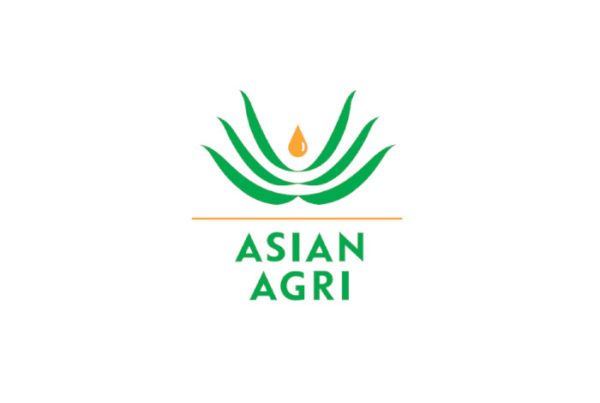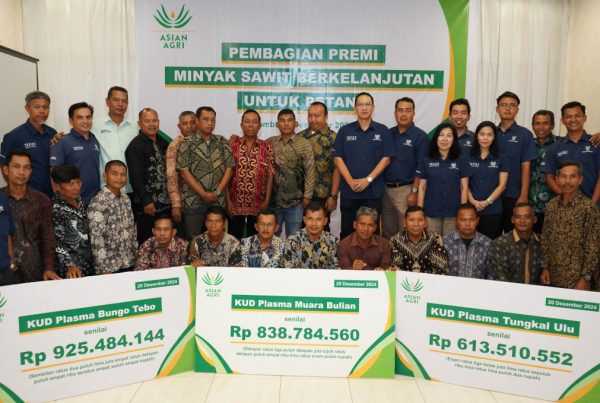Riau, 16 October 2018 – Oil palm farmers who are members of Mulus Rahayu Cooperative, Riau, shared their success with the oil palm replanting program when they received a visit from the Deputy for Food and Agriculture Coordination, the Coordinating Ministry of Economic Affairs of the Republic of Indonesia, Ir. Musdhalifah Machmud, MT in Delima Jaya Village, Siak Regency, Riau on 10 October.
“Assistance from the company to farmers through a partnership program is necessary to support one another,” Musdhalifah said in her greeting. She emphasized that farmers must be careful in selecting quality seeds as it is an important factor in ensuring high productivity of their replanted plantations.
Musdhalifah’s visit came after a focus group discussion session, “Institutional Strengthening to Support the Implementation of Smallholders’ Oil Palm Replanting”, took place in Pekanbaru. The discussion focused on the pilot replanting program which involved the plantations owned by the Mulus Rahayu Cooperative.
The Mulus Rahayu Cooperative was the first oil palm cooperative to receive assistance from the Government of Indonesia through the Oil Palm Plantation Fund Management Agency (BPDPKS) to replant their oil palms in 2016.
Pawito Saring, Head of Mulus Rahayu Cooperative, explained the various challenges he has experienced throughout the process, from preparing the field to implementing the replanting.
“We are grateful to be the first farmers to receive replanting funds from the government. Our partnership with Asian Agri has been beneficial, as the company supports us by ensuring that our needs and requirements are fulfilled. This is both in terms of the actual replanting process in the field but also in terms of economic support, so that we do not need to face significant challenges and the replanting can go smoothly,” Pawito said.
A total of 135 farmers from Mulus Rahayu Cooperative have committed to replanting their oil plantations covering an area of up to 310 hectares, which are set to see their first harvests in the near future.
“We hope that our success story can inspire our fellow oil palm farmers to not feel insecure about replanting their plantations. Government and company support will be very helpful in optimising our plantations’ productivity,” Pawito said.
Asian Agri’s Head of Partnership, Pengarapen Gurusinga also said that support towards the farmers by the company via partnership programs as well as the government is an important factor in the success of the replanting program.
“Asian Agri supports its smallholders who are committed to replanting their plantations, from the preparation period to seeking access to alternative funding or economic support. In this way, our partner farmers do not need to be worried about replanting,” said Guru.
***
About Asian Agri:
Asian Agri is one of Indonesia’s largest palm oil producers since 1979. Today, the company manages 100,000 hectares of land and employs over 25,000 people. A pioneer of the Indonesian government’s Trans-National Government Migration (PIR-Trans) program, Asian Agri works with 30,000 plasma smallholders in Riau and Jambi who operate 60,000 hectares of palm oil plantations, as well as independent smallholders, bringing about positive impact on their quality of life and economic development.
Implementing a strict “no burn” policy and best practices in sustainable plantation management, Asian Agri has helped its smallholder partners improve productivity, yield and supply chain traceability, while assisting them obtain certifications. The company’s mills are technologically advanced and energy self-sufficient, minimizing greenhouse gas emissions.
Asian Agri is a member of the Roundtable on Sustainable Palm Oil (RSPO). More than 86% of both owned plantations in North Sumatra, Riau & Jambi provinces and 100% of scheme smallholder plantations in Riau & Jambi provinces have been RSPO certified. All plantations, including those owned by smallholders, have been certified by ISCC (International Sustainability & Carbon Certification). More than 91% of plantations and mills owned by Asian Agri have been ISPO (Indonesian Sustainable Palm Oil) certified.
The company’s operations are ISO 14001 certified, while its Learning Institute and nursery research center in Riau province, Indonesia are both ISO 9001 certified. Asian Agri’s R&D Center in North Sumatra was also given a certification by the International Plant-Analytical Exchange at the WEPAL lab at Wageningen University in The Netherlands, for its high standards.
For further information, please contact:
| Dinna Permana Setyani |
| Corporate Communication Manager |
| E-mail: DinnaPermana@www.asianagri.com |
| DID: (021) 230 1119 |




